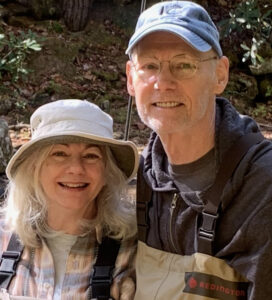Elizabeth Jetton, a coach for financial planners and a strategic consultant to the Financial Planning Association, has been pushing the industry needle from financial planning to “financial life planning” for years. In her own words, this holistic model is “focused on not only riches of life but also on what defines richness of life.” She’s also passionate about planning for the second half of life and integrating positive aging into financial planning. Rethinking65 recently spoke with Jetton, a CFP and former FPA president, about the changes she’s led in financial planning and what advisors must do to truly help clients in the retirement years.
Jerilyn Klein: Elizabeth, how did you first get involved in financial planning and can you briefly tell us about your career journey?
Elizabeth Jetton: It was not linear and I don’t think most people’s paths in this profession are very linear. I majored in journalism and then started in Atlanta, in the early 1980s, as one of the first female stockbrokers at a regional firm. I loved getting to work with people and their money; I didn’t love the sales environment. Then I met some CFPs and realized this work was really about helping people with their money in their life. So I switched gears, got my CFP, and went to work for a firm in New York City. The financial planning industry was young and the ink wasn’t dry on what it is we’re supposed to be doing. I still didn’t quite feel like we were hitting the mark — we were doing investment policy statements for people and filing some insurance — so I started to paint this picture for myself about the practice I wanted to build.
I ended up moving back to Atlanta and ultimately joined forces with another planner [Michael J. Smith], who became my husband. We really wanted to focus on comprehensive financial planning, with the investment piece being a part of that. Michael and I had our own practice, Financial Vision Advisors, before merging with RTD Financial Advisors. I got to be director of financial planning and coach financial planners. I really got interested in working on the profession — the bigger questions around what is our purpose, who do we serve and how do we deliver quality care — after being president of FPA.

After I retired from practice, I got my graduate degree in adult learning and leadership. We have to think about financial planning as adult education, and we have to understand how adults learn in order to do this well.
Klein: What piqued your interest in planning for older adults?
Jetton: I was invited to speak at a positive aging conference, and it kind of blew me away. I realized there’s so much work to be done in how we do planning, and overcoming our own biases, so we can make a positive impact and get out of the old 20th century model that sees people as one of three things: They’re in the accumulation phase; they retire; and they’re in the decumulation phase and die.
At this conference, I met gerontologists, social scientists, medical professionals, architects and all these people who were doing research and deeply interested in a new model of what it means to live in the second half of life so much more dynamically. And I thought, oh my gosh, if we don’t change how we do this and think about people’s lives, we’re not going to be relevant in the 21st century. So, I started focusing on positive aging and planning for the second half of life, which I don’t think we did well at all in the 20th century and still aren’t doing great.
Klein: What are advisors missing, and how are people living more dynamically?
Jetton: We were discounting the richness of life that happens in the third and fourth ages of life, especially as we have ways to stay healthy longer. We need to be interested in the different ways people will approach retirement. Some will want to spend more money because they’re going to go back to school, they’re going to travel more, they want to run a nonprofit. That visual picture of a person on the golf course, sitting in a rocking chair, and walking down the beach – that’s all lovely but it’s B.S. Let’s not assume everybody who comes to us as an older client is retired.
I met a woman at the positive aging conference who got her PhD in her 70s and she said, “Paid or unpaid work till the day I die.” It wasn’t because she needed the money; people still need a purpose. They’re driven by meaning and become more creative. One of the best speakers I’ve heard, and sadly he passed way, was Dr. Gene Cohen, who wrote books that debunked the whole idea that decline is inevitable. He talked about creativity and how the brain changes in positive ways. These are things we need to understand so we know how to work with clients and be more impactful. We have to get outside our own bias.
Klein: What biases do you see among advisors?
Jetton: There’s this narrow, non-nuanced view of people in retirement or people past a certain age that they’re not interested in anything, or there’s not much interesting to do with them. When I was in graduate school, I took a course on inclusivity, equity and diversity. People understood their biases when it came to racial bias and gender bias, but when we got to ageism, people just thought they were right. It was shocking.
That’s the biggest bias. I hear it from young planners, but even older planners don’t do a good job. They stop asking interesting questions, they stop doing goals planning in the same way for older clients. It’s really insulting! I went back to graduate school at 62; I’m creating a new business and writing a book.
Look at Bruce Springsteen, in his 70s. Let’s talk about the Rolling Stones. You may not like their music, but come on, do you think they want to sit in your office and talk about their retirement plan? I don’t think so — it’s about their life. Look at AARP; when I started doing this work, it stood for the American Association of Retired Persons. Now it’s about “real possibilities.”
Klein: You mentioned the third age of life. How do you define this, and is it based on chronological age?
Jetton: It’s more internal than chronological. I took this from psychology and from Gene Cohen’s work where he revisited the stages of life. The third age goes from middle age to a certain point in being a senior. It’s a time when there is a shift. We might have called it the midlife crisis, but it tends to be a shift towards more meaning. And it’s a time when financial planners better be ready, thinking about being their advocate, because this is a time when clients come in and they’re different.
One client, the president of a company, came in to talk about his deferred comp and all of his benefit plans. We asked some deep questions, and he put his pen down and said, “Well, what I really want to do at this phase of my life — I hate my work, I really hate it, and I’m not with my family enough — is to move to Barcelona and sit with the old men and drink coffee and write a book and be with my wife and children.” And that’s the plan he did.
It’s not always that extreme, and it could be someone in their 40s, 50s, or 60s. They’ve kind of done the accomplishment thing, their ego is built, they’ve got a family. It’s sort of, “Now what? It’s not everything I thought it would be.”
Klein: How can financial planners help people in the third age?
Jetton: We need something more than a reserves account; I think there needs to be an opportunities fund. A “what next, oh my gosh, I want a new life” fund is extreme. But as we’re living longer, the idea that people just go to work at 22, and then stop, that’s not this world anymore. They’re going to have multiple careers and take sabbaticals. We need to completely overhaul the idea that retirement planning is the core focus of financial planning. To me, that’s a big mistake. We really are doing financial life planning: “Where are you in your life? Let’s look ahead, let’s make sure you have money for later education for yourself, or new experiences. You’re going to retool, you’re going to have to, the world is changing.”
Other clients had a big farm and owned some commercial building that provided a lot of income, but they wanted to sell everything and buy a million-dollar rock-and-roll tour bus, not have a home. I’m giving you extremes, but almost everybody has something that shifts. We have to make space for these shifts, prepare clients and get them through them.
The third age is also when we start to see other kinds of transitions. Clients’ children are now older, their family is more complicated, health issues may appear, they could have elderly parents. So there’s a whole new set of issues that come into play — personally, financially, emotionally and psychologically — that we must tend to.
Klein: And what about the fourth age?
Jetton: They’re retired, maybe their health isn’t as great. This is when people start thinking about legacy and more about others. We want to make sure they’re doing pre-death planning that’s really intentional and really good planning around health decisions — not just checking the boxes and doing templates with their attorney but really having a conversation. We may have to start looking at what we do if we’re seeing cognitive decline: Do we have all those ducks in a row and who is important to them? It’s not just about the decline but also about, “What do you want to do? What do you have to say? and What do you want to leave?” There’s a lot of richness to it.
Klein: Did the industry previously break out the third and fourth ages?
Jetton: Michael Stein talked about the Go Go, Slow Go and No Go phases of retirement. That was about all we had. And thank you, Michael, for that initial effort. But now we have much more research, and models to work with this is a more refined way.
“However, when you look at the seven-step financial planning process, the CFP Board has completely continued to drop the ball. Its seventh step is monitoring and maintenance. I’m sorry, you don’t monitor and maintain human beings.”
However, when you look at the seven-step financial planning process, the CFP Board has completely continued to drop the ball. Its seventh step is monitoring and maintenance. I’m sorry, you don’t monitor and maintain human beings. We’re a helping profession; we need to offer ongoing care. People are always in transition, something’s always happening, and it’s always our job to wonder: What is it? How do I help?
Klein: You’ve mentioned that healthy aging is productive aging. What can advisors do to help clients achieve this? Is it their place to say, “I really think you should get out there and walk around the block, watch your diet and find some hobbies?”
Jetton: I love that question. It’s certainly not our job to be prescriptive in those areas. However, I do think it’s appropriate to ask questions in all these areas because they impact finances. It’s absolutely appropriate to say, “You don’t have to tell me anything you don’t want to tell me, but it does have implications for what you’re going to spend money on going forward and the decisions you’re going to need to make. So, I’d like to hear a little bit about your health if you can tell me.” We’re more asking than telling people what to do in those areas.
Another area that I think is important is home. You always hear people want to age at home. Well, okay, my dad wanted to age at home and his house was 60 years old and it was costing a fortune to maintain that house, and he didn’t have that kind of money. Conversations can include, “Tell me about your neighborhood. Tell me about your house — how much is it to maintain and how old is it? Do you still know your neighbors or has the neighborhood changed a lot? How far is your grocery store? Is your church nearby?” I’m trying to understand: Is this the place it used to be, or is it a problem or going to be a problem?
There’s a real important emotional, psychological and social imperative in people’s lives as they get older. So we also ask, “Tell me about your friends, are they still living in your neighborhood?” Understanding these different aspects of their life is our job because it gives us a more complete picture. The research will tell you, if people don’t have friends or a sense of place or interests, they’re going downhill fast. And they’re also going to make bad money decisions if they lack a positive attitude.
“The research will tell you, if people don’t have friends or a sense of place or interests, they’re going downhill fast. And they’re also going to make bad money decisions if they lack a positive attitude.”
Klein: In March 2020, the Journal of Financial Planning published your cover story on your six-step model for client meetings. Now that social distancing and virtual communication are so prevalent, how can advisors improve communication with seniors?
Jetton: The model still works, but I think you have to say something at the beginning of the meeting about the oddities of Zoom and that there may be an awkward delay. It can have a psychological impact, so we need to be willing to take ownership as a planner. We can stop every now and then and say to the client, “I’m not sure I read that right” or “I’m looking at you and wondering, is there something else you want to tell me?” We can’t quite read things the same way we can in person — we can’t see whether their hands are clenched or their arms are crossed.
Klein: What other suggestions do you have for communicating better with older clients?
Jetton: Particularly with people in the second half of life, we tend to make assumptions that we know what’s important. But we also have to shut up to make space for them to tell us. They don’t tell us everything in advance of a meeting in a nice, tidy way. They’re human beings, they’re messy, and we have to give space for that, or we run a meeting that completely misses the mark of what’s important to them. And that’s a disaster.
“Particularly with people in the second half of life, we tend to make assumptions that we know what’s important. But we also have to shut up to make space for them to tell us.”
It’s also important to make space for longer meetings because they talk in stories— we all know this if we have grandparents or parents. It can be frustrating if we set aside an hour for a meeting and 30 minutes into it, they’re still telling a story. But there’s probably some gold in that story; the client is telling it because it matters. It may be about their grandchildren or about what they were doing yesterday. The key is to not take it at face value. Instead, I might follow up with something like, “It sounds like this is something really important to you. Does this need to be part of your planning?”
A conversation can also highlight the changing alignment of a couple. Perhaps the husband says he’s looking forward to living in Florida near his buddies so he can play golf and then the wife says, “Well, I sort of imagined living closer to our children so we could be in our grandchildren’s lives.” They never said that to each other before, but they said it in front of us because we made space for them to have that conversation and asked the quieter spouse what they were thinking about. It’s not easy, but now that’s the conversation and we can say, “Let’s explore this.”
Klein: Any final thoughts?
Jetton: We do all this work behind the scenes, so we know the financial implications, but if that’s all we do we are missing our real value to people. We’re their thinking partner — I wish I had come up with this, but it came from financial planner Josh Yager.
He also said to me, “I’m advocating for the client as they are today sitting across from me — their needs, their goals, their challenges — but I also have to advocate for who they’re going to become. Right here today, I have to advocate for that version of themselves, because nobody else is and it’s my job to see what’s coming.” He said it years and years ago, and I’ve quoted him, almost feels like, every day.
Planners have told me they were annoyed with clients because they changed their goals. “I’ve done all that work, and now they’ve gone and changed their mind.” Well, I’m sorry, whose plan is this? That’s our job. I hate the idea that we do plans, a product that we print. We do planning, which is never done. This is iterative, evolving, not linear, clients get to change their mind. Hopefully they will grow, accomplish things, be impacted by life.
I didn’t know I was going back to graduate school and starting an encore career. I mean, people’s lives keep unfolding in surprising, cool ways.
Jerilyn Klein is editorial director of Rethinking65.







